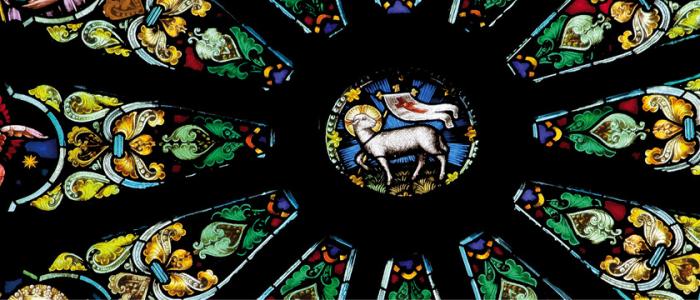
1.26 Pse vdiq Jezusi për ne?
Zoti ka një dashuri të jashtëzakonshme për ne. Prandaj ai dëshiron që të jemi plotësisht të lumtur dhe të jetojmë me të në parajsë. Pavarësisht kësaj, janë mëkatet tona që qëndrojnë mes nesh dhe Zotit. Për shkak të mëkateve tona, ka pak ose aspak vend për Zotin në jetët tona. Duhet t’i bartim kujdeset dhe hidhërimet tona vetëm, sepse nuk ia lejojmë Zotit të hyjë në jetët tona. Kjo mund të na bëjë shumë të palumtur.
Dhe kështu Zoti dërgoi Birin e tij, Jezusin, që ishte krejt pa mëkat. Jezusi u lind si njeri. Me vdekjen në kryq, të gjitha mëkatet njerëzore vdiqën me të. Që nga ai moment, ne mund të bëhemi bijtë adoptivë të Zotit nëpërmjet Pagëzimit. Tani na mbetet vetëm ta pranojmë faljen e Zotit që të ecim përsëri me të!
Pse Kisha i pagëzon fëmijët?
Sepse, meqë kanë lindur me mëkat të rrjedhshëm, ata kanë nevojë që të lirohen prej pushtetit të të Keqit dhe të futen në mbretërinë e lirisë së bijve të Hyjit. [KKKP 258]
Why does the Church adhere to the practice of infant Baptism?
From antiquity the Church has practiced infant Baptism. There is one reason for this: before we decide on God, God has decided on us. Baptism is therefore a grace, an undeserved gift of God, who accepts us unconditionally. Believing parents who want what is best for their child want Baptism also, in which the child is freed from the influence of original sin and the power of death.
Infant Baptism presupposes that Christian parents will raise the baptized child in the faith. It is an injustice to deprive the child of Baptism out of a mistaken liberality. One cannot deprive a child of love so that he can later decide on love for himself; so too it would be an injustice if believing parents were to deprive their child of God’s grace in Baptism. Just as every person is born with the ability to speak yet must learn a language, so too every person is born with the capacity to believe but must become acquainted with the faith. At any rate, Baptism can never be imposed on anyone. If someone has received Baptism as a little child, he must “ratify” it later in life – this means he must say Yes to it, so that it becomes fruitful. [Youcat 197]
Cila është etapa e plotë dhe përfundimtare e Zbulesës së Hyjit?
Kjo etapë është realizuar në Fjalën e Tij të mishëruar, Jezu Krishtin, ndërmjetës dhe plotësi të Zbulesës. Ai, duke qenë i Njëlinduri Bir i Hyjit i bërë njeri, është Fjala e përsosur dhe përfundimtare e Atit. Me dërgimin e Birit dhe me dhurimin e Shpirtit Zbulesa tashmë është kryer plotësisht, edhe pse, përgjatë shekujve, fesë* së Kishës do t’i duhet ta kuptojë pak nga pak rëndësinë e madhe të saj.
“Përderisa ai na ka dhuruar Birin e Vet, që është Fjala e Tij e vetme dhe përfundimtare, Hyji na ka thënë gjithçka njëherësh në këtë Fjalë të Tijën dhe nuk ka më asgjë për të thënë” (Shën Gjoni i Kryqit). [KKKP 9]
Çfarë vlerë kanë zbulesat private?
Edhe pse nuk i përkasin thesarit të fesë, zbulesat private mund të japin ndihmesën e tyre në të jetuarit e besimit*, me kusht që të ruajnë orientimin e tyre të ngushtë kah Krishti. Magjisteri i Kishës, të cilit i takon shoshitja e këtyre zbulesave private, nuk mund t’i pranojë zbulesat që pretendojnë se tejkalojnë apo korrigjojnë Zbulesën përfundimtare që është Krishti. [KKKP 10]
What does God show us about himself when he sends his Son to us?
God shows us in Jesus Christ the full depth of his merciful love.
Through Jesus Christ the invisible God becomes visible. He becomes a man like us. This shows us how far God’s love goes: he bears our whole burden. He walks every path with us. He is there in our abandonment, our sufferings, our fear of death. He is there when we can go no farther, so as to open up for us the door leading into life. [Youcat 9]
With Jesus Christ, has everything been said, or does revelation continue even after him?
In Jesus Christ, God himself came to earth. He is God’s last Word. By listening to him, all men of all times can know who God is and what is necessary for their salvation.
With the Gospel of Jesus Christ, the revelation of God is perfect and complete. To make it comprehensible to us, the Holy Spirit leads us ever deeper into the truth. God’s light breaks so forcefully into the lives of many individuals that they “see the heavens opened” (Acts 7:56). That is how the great places of pilgrimage such as Guadalupe in Mexico or Lourdes in France came about. The “private revelations” of visionaries cannot improve on the Gospel of Jesus Christ. No one is obliged to believe in them. But they can help us understand the Gospel better. Their authenticity is tested by the Church. [Youcat 10]
Cilat janë pasojat e flisë së Jezusit në Kryq?
Jezusi e ka ofruar lirisht Vetveten si fli fajshlyese, domethënë: i ka ndrequr fajet tona me anë të bindjes së plotë të dashurisë së Vet deri në vdekje. Kjo “dashuri deri në fund [deri në pikën e fundit]” (Gjn 13, 1) e Birit të Hyjit e pajton mbarë njerëzimin me Atin. Pra, flija pashkore e Krishtit i çliron njerëzit në mënyrë të vetme, të përsosur dhe përfundimtare, si edhe u hap atyre bashkësinë me Hyjin. [KKKP 122]
Why did Jesus have to redeem us on the Cross, of all places?
The Cross on which Jesus, although innocent, was cruelly executed is the place of utmost degradation and abandonment. Christ, our Redeemer, chose the Cross so as to bear the guilt of the world and to suffer the pain of the world. So he brought the world back home to God by his perfect love.
God could not show his love more forcibly than by allowing himself in the person of the son to be nailed to the Cross for us. Crucifixion was the most shameful and most horrible method of execution in antiquity. It was forbidden to crucify Roman citizens, whatever crimes they were guilty of. Thereby God entered into the most abysmal sufferings of mankind. Since then, no one can say “God does not know what I’m suffering.” [Youcat 101]
Jezu Krishti, Biri i Hyjit ... i cili me anë të vuajtjes na pajtoi me Hyjin dhe u ringjall prej së vdekuri; i cili është në të djathtën e Atit dhe i përsosur në të gjitha gjërat ... Sepse ai vetë e solli vërtet shëlbimin : pasi ai është vetë Fjala e Hyjit , vetë i Njëlinduri i Atit, Krishti Jezus, Zoti ynë. [Shën Ireneu Kundër Herezive, Bk. 3, Kap. 16 (MG 7, 928)]





